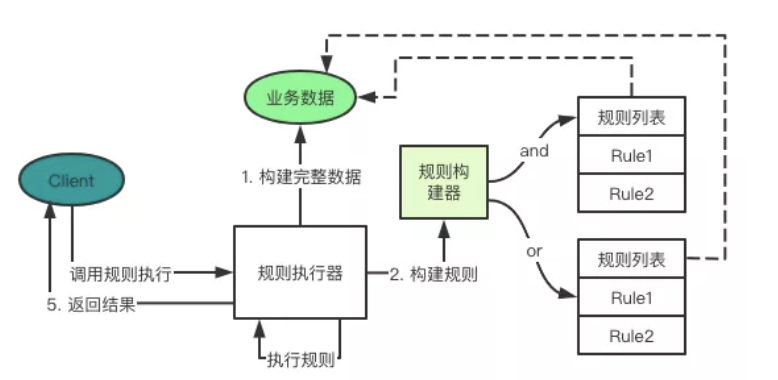Business scenario
Recently, I received a small demand in the company, which needs to expand the existing trial user application rules. Our scenario is roughly as follows:
if (Overseas users) {
return false;
}
if (Billing user) {
return false;
}
if (Unpaid user && No longer service period) {
return false
}
if (Transfer to introduce users || Paying user || Push user) {
return true;
}
According to the above conditions, we can conclude that:
-
Our main process is mainly based on the relationship between and or.
-
If there is a mismatch, in fact, our subsequent processes do not need to be executed, but need to have a short-circuit function.
-
For the current situation, if I change it on the original basis, I just need to pay a little attention to solve the problem that the demand is not very big, but the maintainability is very poor.
After weighing later, I decided to refactor this part.
Rule executor
To meet this demand, I first sorted out the general design of our rule executor, and then I designed a V1 version to share with you. If you also have such a case, you can share a message with me. The following part is mainly about the design and implementation process and code
Design rule of executor

Abstraction of rules and implementation of rules
//Business data
@Data
public class RuleDto {
private String address;
private int age;
}
//Rule abstraction
public interface BaseRule {
boolean execute(RuleDto dto);
}
//Rule Template
public abstract class AbstractRule implements BaseRule {
protected <T> T convert(RuleDto dto) {
return (T) dto;
}
@Override
public boolean execute(RuleDto dto) {
return executeRule(convert(dto));
}
protected <T> boolean executeRule(T t) {
return true;
}
}
//Specific rules - Example 1
public class AddressRule extends AbstractRule {
@Override
public boolean execute(RuleDto dto) {
System.out.println("AddressRule invoke!");
if (dto.getAddress().startsWith(MATCH_ADDRESS_START)) {
return true;
}
return false;
}
}
//Specific rules - Example 2
public class NationalityRule extends AbstractRule {
@Override
protected <T> T convert(RuleDto dto) {
NationalityRuleDto nationalityRuleDto = new NationalityRuleDto();
if (dto.getAddress().startsWith(MATCH_ADDRESS_START)) {
nationalityRuleDto.setNationality(MATCH_NATIONALITY_START);
}
return (T) nationalityRuleDto;
}
@Override
protected <T> boolean executeRule(T t) {
System.out.println("NationalityRule invoke!");
NationalityRuleDto nationalityRuleDto = (NationalityRuleDto) t;
if (nationalityRuleDto.getNationality().startsWith(MATCH_NATIONALITY_START)) {
return true;
}
return false;
}
}
//Constant definition
public class RuleConstant {
public static final String MATCH_ADDRESS_START= "Beijing";
public static final String MATCH_NATIONALITY_START= "China";
}
Actuator construction
public class RuleService {
private Map<Integer, List<BaseRule>> hashMap = new HashMap<>();
private static final int AND = 1;
private static final int OR = 0;
public static RuleService create() {
return new RuleService();
}
public RuleService and(List<BaseRule> ruleList) {
hashMap.put(AND, ruleList);
return this;
}
public RuleService or(List<BaseRule> ruleList) {
hashMap.put(OR, ruleList);
return this;
}
public boolean execute(RuleDto dto) {
for (Map.Entry<Integer, List<BaseRule>> item : hashMap.entrySet()) {
List<BaseRule> ruleList = item.getValue();
switch (item.getKey()) {
case AND:
//If it is a , and , relationship, execute synchronously
System.out.println("execute key = " + 1);
if (!and(dto, ruleList)) {
return false;
}
break;
case OR:
//If it is an , or , relationship, execute in parallel
System.out.println("execute key = " + 0);
if (!or(dto, ruleList)) {
return false;
}
break;
default:
break;
}
}
return true;
}
private boolean and(RuleDto dto, List<BaseRule> ruleList) {
for (BaseRule rule : ruleList) {
boolean execute = rule.execute(dto);
if (!execute) {
//And relationship matching fails once, and false is returned
return false;
}
}
//And , all relationships match successfully, and , true is returned
return true;
}
private boolean or(RuleDto dto, List<BaseRule> ruleList) {
for (BaseRule rule : ruleList) {
boolean execute = rule.execute(dto);
if (execute) {
//or , returns , true if the relationship matches one
return true;
}
}
//or , false is returned if none of the relationships match
return false;
}
}
Call of actuator
public class RuleServiceTest {
@org.junit.Test
public void execute() {
//Rule executor
//Advantages: it is relatively simple. Each rule can be independent. The rule, data and actuator are separated, and the caller is relatively regular
//Disadvantages: data depends on the common transmission object dto
//1. Define init rule
AgeRule ageRule = new AgeRule();
NameRule nameRule = new NameRule();
NationalityRule nationalityRule = new NationalityRule();
AddressRule addressRule = new AddressRule();
SubjectRule subjectRule = new SubjectRule();
//2. Construct the required data # create # dto
RuleDto dto = new RuleDto();
dto.setAge(5);
dto.setName("Zhang San");
dto.setAddress("Beijing");
dto.setSubject("mathematics");;
//3. Build and execute # rule # execute through chain call
boolean ruleResult = RuleService
.create()
.and(Arrays.asList(nationalityRule, nameRule, addressRule))
.or(Arrays.asList(ageRule, subjectRule))
.execute(dto);
System.out.println("this student rule execute result :" + ruleResult);
}
}
summary
Advantages and disadvantages of rule executors
advantage:
-
It is relatively simple. Each rule can be independent. The rule, data and actuator are separated, and the caller is relatively regular;
-
I define the convert method in the rule template class to convert parameters, which can provide expansion for the scene data required by specific rules.
Disadvantages:
-
The upper and lower rule s are data dependent. If it is unreasonable to directly modify the public transmission object dto, it is recommended to build the data in advance.